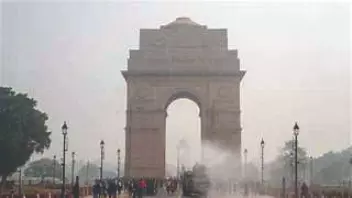Choke: Delhi breathes easy by morning, struggles by evening

New Delhi: While the weather in Delhi showed typical late-monsoon traits, the city’s air quality continued to draw attention. Data from the Central Pollution Control Board (CPCB) placed the Air Quality Index (AQI) at 105 at 9 AM, falling in the “moderate” bracket. By late evening, however, monitoring agencies reported that levels had worsened, moving into the “unhealthy for sensitive groups” category with readings above 140. Such conditions pose risks for children, senior citizens, and individuals with respiratory ailments.
The CPCB categorizes AQI values between 0 and 50 as “good,” 51–100 as “satisfactory,” 101–200 as “moderate,” 201–300 as “poor,” 301–400 as “very poor,” and anything above 400 as “severe.” Though Sunday morning’s reading suggested manageable pollution, the spike during the day highlighted how quickly Delhi’s air quality can deteriorate.
Globally, Delhi ranked as the third most polluted major city on Sunday morning, with Mumbai, Gurugram, and Noida also reporting unhealthy levels. This underscores the widespread challenge of air pollution across northern India during the seasonal transition.
Experts attribute the capital’s recurring air quality crisis to multiple factors. Local contributors include emissions from vehicles, industries, and large-scale construction. Regional influences such as stubble burning in Punjab and Haryana significantly aggravate pollution in the post-monsoon period. Additionally, winter-like atmospheric conditions, such as temperature inversion and sluggish wind movement, trap pollutants closer to the ground, intensifying smog episodes.
Although short-term forecasts indicate that pollutant levels may dip as winds strengthen later in the day, longer-term solutions remain elusive. Annual data shows that Delhi’s PM2.5 concentrations still exceed World Health Organization (WHO) safety guidelines by nearly 22 times, reflecting chronic exposure for millions of residents.
Delhi began its Sunday with warm and humid conditions as the minimum temperature was logged at 25.6°C. The India Meteorological Department (IMD) noted that the sky would remain partly cloudy through the day, with the mercury expected to climb
close to 35°C. Relative humidity stood at 77 percent in the morning, adding to the discomfort of residents.
The recurring spikes serve as a reminder that meaningful improvements in Delhi’s air quality will depend not only on favorable weather but also on coordinated efforts to reduce emissions across the region.



